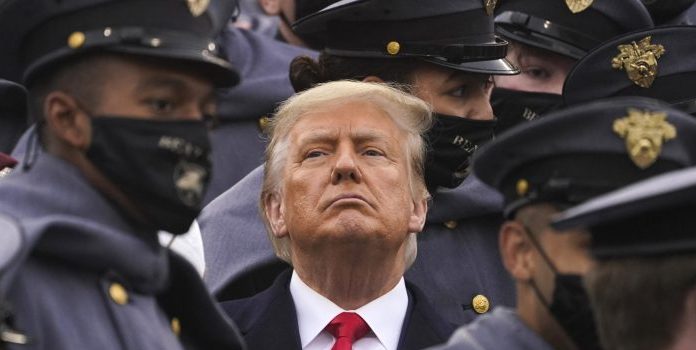(Headline USA) President Donald Trump on Saturday suggested that China — not Russia — may be behind the cyber espionage operation against the United States.
In his first comments on the breach, Trump scoffed at the focus on the Kremlin.
The Cyber Hack is far greater in the Fake News Media than in actuality. I have been fully briefed and everything is well under control. Russia, Russia, Russia is the priority chant when anything happens because Lamestream is, for mostly financial reasons, petrified of….
— Donald J. Trump (@realDonaldTrump) December 19, 2020
….discussing the possibility that it may be China (it may!). There could also have been a hit on our ridiculous voting machines during the election, which is now obvious that I won big, making it an even more corrupted embarrassment for the USA. @DNI_Ratcliffe @SecPompeo
— Donald J. Trump (@realDonaldTrump) December 19, 2020
Secretary of State Mike Pompeo said late Friday that Russia was “pretty clearly” behind the operation against the United States.
“This was a very significant effort and I think it’s the case that now we can say pretty clearly that it was the Russians that engaged in this activity,” Pompeo said in the interview with radio talk show host Mark Levin.
Pompeo in the interview said the government was still “unpacking” the cyberespionage operation and some of it would likely remain classified.
“But suffice it to say there was a significant effort to use a piece of third-party software to essentially embed code inside of U.S. government systems and it now appears systems of private companies and companies and governments across the world as well,” he said.
It’s not clear exactly what the hackers were seeking, but experts say it could include access to voting machines, nuclear secrets, blueprints for advanced weaponry, COVID-19 vaccine-related research and information for dossiers on government and industry leaders.
Russia has said it had “nothing to do” with the hacking.
While Trump downplayed the impact of the hacks, the Cybersecurity and Infrastructure Security Agency has said it compromised federal agencies as well as “critical infrastructure.”
Homeland Security, the agency’s parent department, defines such infrastructure as any “vital” assets to the U.S. or its economy, a broad category that could include power plants and financial institutions.
Pompeo, in the interview with Levin, said Russia was on the list of “folks that want to undermine our way of life, our republic, our basic democratic principles. … You see the news of the day with respect to their efforts in the cyberspace. We’ve seen this for an awfully long time, using asymmetric capabilities to try and put themselves in a place where they can impose costs on the United States.”
What makes this hacking campaign so extraordinary is its scale: 18,000 organizations were infected from March to June by malicious code that piggybacked on popular network-management software from an Austin, Texas, company called SolarWinds.
It’s going to take months to kick elite hackers out of the U.S. government networks they have been quietly rifling through since as far back as March.
Adapted from reporting by the Associated Press.

